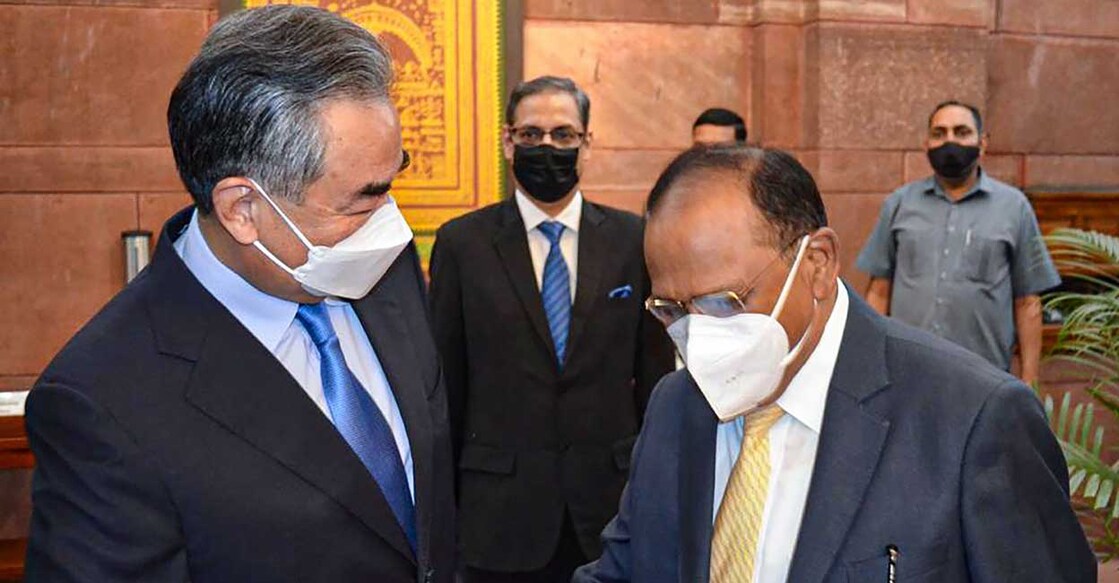NSA meets Chinese Foreign Minister, calls for complete disengagement of troops in eastern Ladakh

Mail This Article
New Delhi: NSA Ajit Doval on Friday pressed Chinese Foreign Minister Wang Yi for early and complete disengagement of troops in remaining friction points in eastern Ladakh, official sources said. He also called for removing "impediments" to allow the bilateral ties to take their natural course, they said.
Wang, who holds the rank of state councillor, arrived in Delhi on Thursday evening from Kabul on an unannounced visit. The NSA and the visiting Chinese foreign minister held extensive talks on the border row.
Doval conveyed to Wang that the restoration of peace and tranquillity in the border region will help build mutual trust and create enabling environment for progress in relations, the sources said, adding that the discussions were held in a cordial atmosphere.
The NSA told Wang that the continuation of the present situation in eastern Ladakh is not in mutual interest and there was need to ensure that actions do not violate the spirit of equal and mutual security, the sources said.
Doval emphasised the need to continue positive interactions at diplomatic and military levels for restoration of peace and tranquillity, saying it is a prerequisite for normalisation of ties between the two sides, they said.
They said the NSA particularly highlighted the need for resolving outstanding issues as quickly as possible and talked about the need for maturity and sincerity in dealing with the issue.
The sources said the Chinese side invited the NSA to visit China to take forward the mandate of special representatives on the boundary question.
The NSA responded positively to the invitation and stated that he could visit after immediate issues are resolved successfully, the sources said.
Doval and Wang have been serving as the Special Representatives (SR) for boundary talks between the two countries. They had held a lengthy telephonic conversation in July 2020 with a focus on bringing down tension in eastern Ladakh.
India and China have been holding high-level military talks to resolve the face-off in the remaining friction points in eastern Ladakh. Both sides withdrew troops already from some of the friction points following the talks.
On March 11, India and China held the 15th round of high-level military dialogue to resolve the pending issues in the eastern Ladakh region. However, there was no forward movement in the talks which were aimed at resolving the remaining issues.
The border standoff between the Indian and Chinese militaries erupted on May 5, 2020, following a violent clash in the Pangong lake areas.
The face-off escalated after the Galwan Valley clashes on June 15, 2020. As many as 20 Indian soldiers and an unspecified number of Chinese troops were killed in the clashes.
Both sides gradually enhanced their deployment by rushing in tens of thousands of soldiers as well as heavy weaponry.
As a result of a series of military and diplomatic talks, the two sides completed the disengagement process last year in the north and south banks of the Pangong lake and in the Gogra area. Each side currently has around 50,000 to 60,000 troops along the LAC in the sensitive sector.

EAM Jaishankar holds talks
Meanwhile, External Affairs Minister S Jaishankar and his visiting Chinese counterpart Wang Yi held extensive talks covering the eastern Ladakh row and the geopolitical turmoil triggered by the crisis in Ukraine.
"Greeted Chinese FM Wang Yi at Hyderabad House. Our discussions commence shortly," Jaishankar tweeted in the first official comment by India on the Chinese foreign minister's trip.
Ahead of talks with Jaishankar, Wang met National Security Adviser Ajit Doval. There was no official comment on the meeting.
Jaishankar and Wang have met in Moscow and Tajik capital Dushanbe on the sidelines of multilateral events in the last one-and-a-half years. But this is the first high-level visit between India and China after their ties came under severe strain following the border standoff in eastern Ladakh nearly two years ago.
Ahead of the visit, India criticised Wang over his remarks on Kashmir at a meeting of the Organisation of Islamic Cooperation (OIC) in Pakistan. For China, it is learnt, the visit is more to do with the geopolitical turmoil in the wake of the Russian invasion of Ukraine than bilateral ties.

